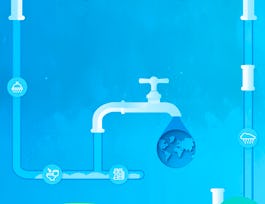Climate change has been high on the political agenda for years, yet greenhouse gas emissions continue to rise. Globally, communities are already experiencing the consequences of the crisis in various ways: from increases in extreme weather and changes to ecosystems to rising sea levels and depleting natural resources.



Details to know

Add to your LinkedIn profile
6 assignments
See how employees at top companies are mastering in-demand skills


Earn a career certificate
Add this credential to your LinkedIn profile, resume, or CV
Share it on social media and in your performance review

There are 6 modules in this course
The purpose of this module is to introduce the fundamentals of democracy and climate change. The module provides an overview of the main justifications for why democracy is the most preferred mode of government, and juxtaposes these justifications with the challenges that climate change poses to democracy. The module concludes by outlining how and why democratic innovations might be needed.
What's included
5 videos2 readings1 assignment1 discussion prompt
The purpose of this module is to analyse when, how, and why democracies are failing to address climate change with sufficient action. The module provides an overview of the main causes of inaction, with a focus on lobbyism, policy-inertia, and lack of attention to nonhuman forces. The module concludes by outlining how and why democracy, regardless of the current stalemate, has the potential for reform.
What's included
5 videos2 readings1 assignment1 discussion prompt
The purpose of this module is to explore how and why some actors see climate change as a reason to replace democracy with eco-authoritarianism. The module provides an overview of the history of authoritarianism and offers an in-depth account of how this history informs contemporary eco-authoritarianism in Europe and elsewhere. The module concludes with a discussion of why eco-authoritarianism, regardless of its intuitive appeal, fails to address the challenges of climate change.
What's included
4 videos3 readings1 assignment1 discussion prompt
The purpose of this module is to examine the actions that the international political system has taken to address climate change. The module focuses on institutional reforms by the United Nations and the European Union, and discusses how these reforms affect relations between the global north and the global south. The module concludes with a discussion of how and why institutional reforms from above require democratic innovations from below.
What's included
4 videos2 readings1 assignment1 discussion prompt
The purpose of this module is to analyse how democratic innovations from below enhance the fight against climate change at both local and global scales. The module focuses on climate citizens' assemblies, climate activism, civil disobedience, green neighborhoods, and other non-state actors, and introduces the politics of swarming as an umbrella-term for these innovations. The module concludes with a discussion of how and why a renewal of democracy must take many forms to address climate change.
What's included
8 videos2 readings1 assignment1 discussion prompt
The purpose of this module is to introduce the concept of a "more-than-human democracy" as a way to overcome the limits of contemporary climate politics. The module focuses on the entanglements of human and non-human forces and shows how these entanglements inspire new forms of democratic innovations ranging from artistic performances to the extension of rights to rivers and other ecosystems. The module also includes a discussion of why purely technological solutions are insufficient and why this should lead us to an ecological perspective on democracy. Finally, the module provides a brief overview of the previous five modules and concludes by emphasising that making democracy fit for climate will require new understandings of participation, representation, the relationship between humans and non-humans, and the distribution of authority across both local, national and transnational borders.
What's included
5 videos2 readings1 assignment1 discussion prompt
Instructor

Offered by
Why people choose Coursera for their career




Recommended if you're interested in Social Sciences

Universitat Autònoma de Barcelona

Università di Napoli Federico II

University of Geneva

Banco Interamericano de Desarrollo

Open new doors with Coursera Plus
Unlimited access to 10,000+ world-class courses, hands-on projects, and job-ready certificate programs - all included in your subscription
Advance your career with an online degree
Earn a degree from world-class universities - 100% online
Join over 3,400 global companies that choose Coursera for Business
Upskill your employees to excel in the digital economy


